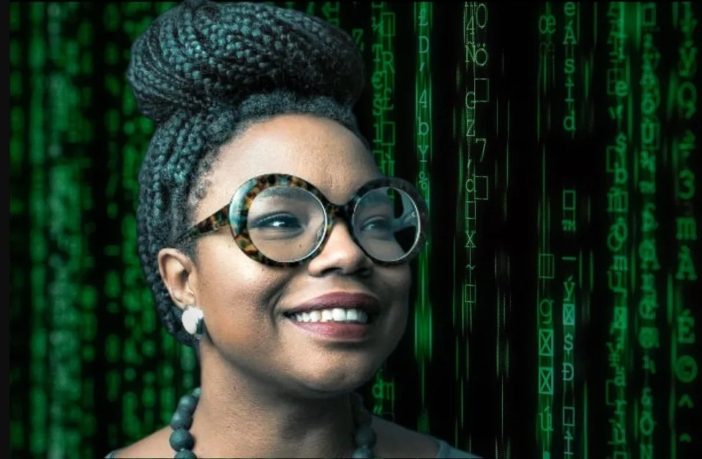By Joseph Williams,
Word in Black
Dr. Fallon Wilson has seen the future, and it is Black.
A technology maven and self-described prophet, her visions are of Black Americans thriving in a society that’s equal parts Black Wall Street, Silicon Valley, and Wakanda. Every Black school and household will have broadband internet access. Well-funded historically Black colleges and universities will be at the vanguard of the nation’s technological innovation and research.
In this world, Black girls code, artificial intelligence doesn’t discriminate, and Black people are driving change in America — just like our enslaved ancestors envisioned.
“I believe Black people are future. We have always thought of ourselves as future,” says Wilson, a renowned social scientist, tech equity advocate and vice president of tech policy at the Multicultural Media, Telecom and Internet Council.
“We have always dreamed. ‘Freedom Dreams’ is one of my favorite books, because (author) Robin D.G. Kelly chronicles how Black people have always imagined freedom,” even if that future didn’t seem attainable.
“We have always had to think of ourselves beyond the current moment,” she says, “because if we stood only in the moment, it would look devastating and demoralizing.”
Described as the Fannie Lou Hamer of tech, Wilson has spent her career working to bring sorely-needed equity to the fast-moving digital world, working with colleges, tech companies, nonprofits, and the White House to make it happen. At the same time, however, she’s an outspoken evangelist for a grassroots Black tech movement “aligned in a vision of freedom.”
That vision emerges in Wilson’s 2019 TEDx-Nashville talk, titled, “Stop Ignoring Black Women and Hear of Our Tech Prophecies.”
In the 15-minute talk, she references civil rights pioneers, scriptures, and Black Joy to upend misconceptions about Black people in the digital landscape — and Black people’s misconceptions about technology.
But she also reminds listeners that the tech divide is real, and that the Black tech future she sees is more realistic than it seems. After all, she says, enslaved Black people had to first imagine freedom before it could even become a realistic possibility.
“I dream of a national unified Black tech ecosystem reminiscent of Black Wall Street before White supremacy annihilated it,” she told the TEDx audience, referring to the Greenwood section of Tulsa, Oklahoma, a flourishing Black community that an angry White mob burned to the ground in 1921. “I dream of a flesh and blood Wakanda-like ecosystem.”
That ecosystem, she says, is centered in bringing broadband internet access to churches and public schools — encouraging legacy organizations like the NAACP to adopt a tech agenda, and standing up organizations like the Algorithmic Justice League and Data for Black Lives.
It sweeps in racial healing, including an acknowledgment of trauma. It speaks truth to powerful tech companies, particularly how lack of diversity results in discriminatory algorithms and biased A.I. And it includes Black Joy as a fundamental principle.
“We have to build a future and have to get black people ready for the world that is currently being built,” she says. “And so the model that we developed for the #BlackTechFutures Research Institute is that it takes an ecosystem to address the main structural challenges that keep Black people from living and thriving in a world where machines are everywhere.”
That future has arrived, Wilson says, with the advent of A.I. and self-driving cars, among other things. But the moment, she says, is also “an opportunity to (destroy) the structural constraints of racial equity for tech futures in this country.”
Smashing those barriers, and realizing the Black community can write its own future, is essential to racial healing, she says.
But the challenge is real: According to the Joint Center for Political and Economic Studies, 34 percent of Black adults do not have home broadband, and 30.6 percent of Black households with one or more children aged 17 or younger lack high-speed home internet. Wilson, however, is bullish on Black future, driven by self-empowerment and overcoming present-day obstacles.
“This is the thing about White supremacy: It keeps you always looking down so that you can never look up and look around and see how everything you need is right there,” Wilson says. “My money’s on us — that’s it.”
“I tell people all the time: We are who we have been waiting for,” she says.
This story was produced in partnership with the W.K. Kellogg Foundation and originally published by Word in Black.



